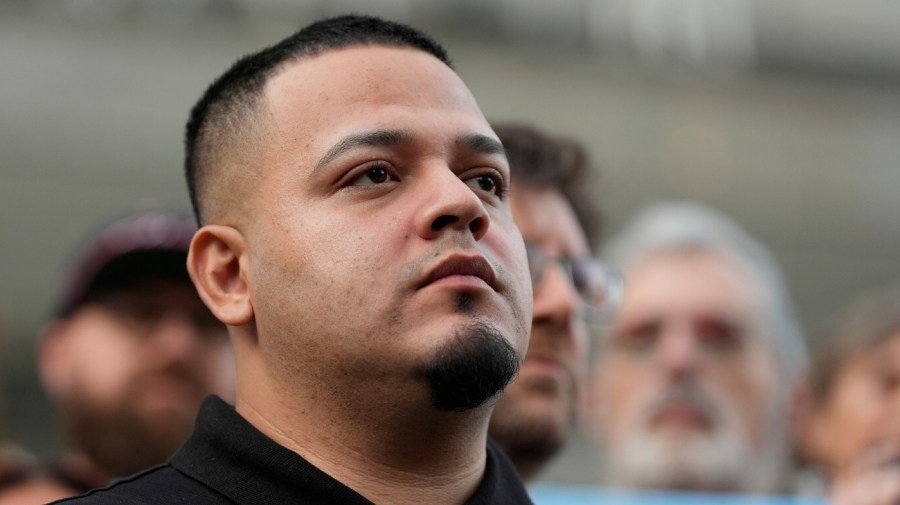A federal judge in Maryland on Monday pressed the Trump administration on its bid to quickly deport Kilmar Abrego Garcia to Liberia, seeking the government’s word that the once mistakenly deported man will not be removed from the country before she lifts an order blocking such a move.
U.S. District Judge Paula Xinis called a hearing Monday after Department of Justice (DOJ) lawyers signaled in court filings last week that Abrego Garcia, a native of El Salvador, could be deported to the West African nation as soon as Friday.
“If I don’t lift the injunction, then obviously you’re abiding by it, and he’s not going to be removed,” Xinis said to the government. “Am I getting that right?”
“Of course, your honor,” DOJ lawyer Drew Ensign replied.
Abrego Garcia’s fight to remain in the U.S. has put him at the heart of President Trump’s crackdown on immigration enforcement.
Earlier this year, the Trump administration wrongly sent Abrego Garcia to El Salvador, despite an immigration judge in 2019 having barred his removal there because of gang threats against his family. After several months in Salvadoran prisons, the administration secured his return — but then hit him with federal human smuggling charges in Tennessee. Abrego Garcia has denied wrongdoing.
Since then, the Trump administration has explored a series of countries as possible deportation destinations, with Liberia as the latest suggestion. The court filing last week said the West African nation has agreed to take him and argued that the country fits Abrego Garcia’s criteria.
“Although Petitioner has identified more than twenty countries that he purports to fear would persecute or torture him if he were removed there, Liberia is not on that list,” DOJ lawyers wrote.
Xinis questioned the administration about its decision to send Abrego Garcia to Africa as opposed to Costa Rica, a country he has said he would go to willingly where the government promised to welcome him as a legal immigrant and to not deport him to El Salvador.
She asked why the parties would continue the hearing when the government could “deport him to a third country tomorrow,” noting everyone involved would “burn significant resources” to fight whether he can legally be sent to Liberia.
The DOJ lawyers said they may provide additional details in an upcoming court filing but did not have the answers immediately.
The judge also questioned how the government’s criminal case against Abrego Garcia could move forward if he was removed from the country, which Ensign said he did not know.
Xinis said she thought it “doesn’t pass the sniff test” that there has not been coordination between the government lawyers working on the civil and criminal cases involving Abrego Garcia, but she seemed satisfied with Ensign’s response that the administration would abide by her injunction if it has not been lifted by Friday.
In the criminal case, an evidentiary hearing is scheduled for Nov. 4 and 5, where Abrego Garcia’s motion to dismiss on the basis that he has been selectively and vindictively prosecuted will be considered after a federal judge ruled he showed a realistic likelihood his motion will succeed.
The U.S. attorney in Tennessee who brought the case against Abrego Garcia is expected to testify, and Abrego Garcia has sought to force other top DOJ officials to take the stand as well, including Deputy Attorney General Todd Blanche. The government has moved to quash the subpoena.
U.S. District Judge Waverly Crenshaw, who is overseeing the case, has asked for Abrego Garcia to respond to the government’s request to block Blanche and other officials’ testimony by Thursday, signaling a ruling could come before the hearing.
On Monday, Crenshaw also ordered all DOJ and Department of Homeland Security officials involved in the case, up to Attorney General Pam Bondi and Homeland Security Secretary Kristi Noem, to refrain from making extrajudicial comments posing a “substantial likelihood of materially [prejudicing] this proceeding,” citing their remarks about Abrego Garcia and the case. Top officials have painted Abrego Garcia as an MS-13 gang member, which he denies.
“Abrego rightly notes that he is entitled to trial ‘by an impartial jury’ and that pervasive and
inflammatory pre-trial publicity might compromise this fundamental right,” the judge wrote.
